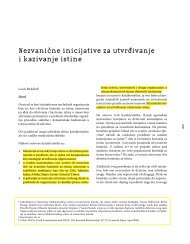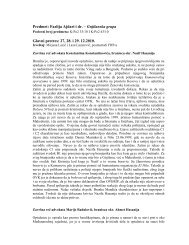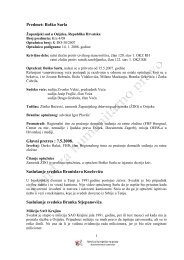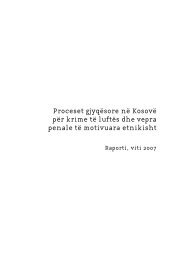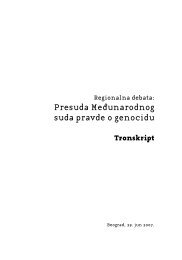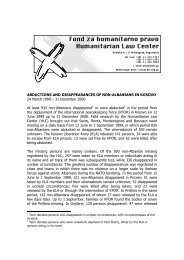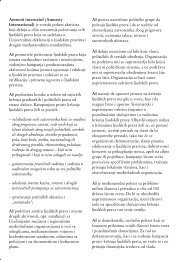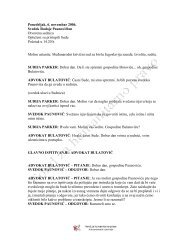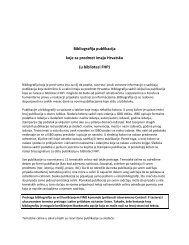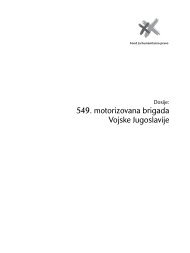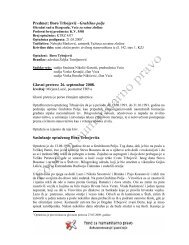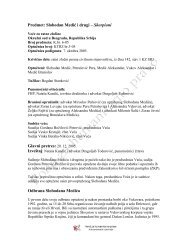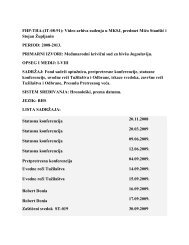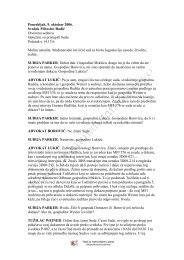here - Humanitarian Law Center/Fond za humanitarno pravo
here - Humanitarian Law Center/Fond za humanitarno pravo
here - Humanitarian Law Center/Fond za humanitarno pravo
Create successful ePaper yourself
Turn your PDF publications into a flip-book with our unique Google optimized e-Paper software.
The Court of Appeal in Belgrade, upon hearing appeals from the defense and Kesar’s wife, on 28<br />
February 2011 accepted the appeals, set aside the judgment of the Higher Court and remitted the<br />
case for retrial. 177<br />
At the retrial, which opened on 8 June 2011, the trial court, acting upon instructions of the Court<br />
of Appeal, examined witnesses Gvozden and Knežević and allowed them to confront the accused<br />
face-to-face.<br />
On 1 December 2011, Duško Kesar was convicted again and sentenced to 15 years<br />
imprisonment. Stating the reasons for the conviction, the presiding judge said that the court gave<br />
credence to the testimony of witness Gvozden, who convincingly testified about finding indictee<br />
Kesar, in the company of Krndija and Radaković, outside the house of the Rizvić family on the<br />
relevant evening. His testimony was corroborated by Krndija, who said that he and Kesar each<br />
had thrown a hand grenade at the Rizvić’s house. The joint action, throwing of hand grenades,<br />
planting of explosives, by indictees Radaković and Krndija, based on a previous agreement, and<br />
the murder of the victims constitute a clear and mutually co<strong>here</strong>nt sequence of events, which<br />
demonstrate that the accused had a direct intent to kill. In determining sentence on the accused,<br />
the Court accepted lack of previous convictions, family circumstances, unemployment and health<br />
status of the accused as mitigating circumstances. An aggravating circumstance was the murder<br />
of three civilians.<br />
Upon hearing appeals filed by defense counsel and the wife and mother of the accused against the<br />
judgment delivered in the retrial, the Court of Appeal on 30 November 2012 acquitted the<br />
accused.<br />
The Court of Appeal held that t<strong>here</strong> was no solid and compelling evidence demonstrating that<br />
Duško Kesar was involved in the commission of the crime in question. His mere presence outside<br />
the Rizvićs’ house, in the company of Draško Krndija and Drago Radaković, at the time when<br />
hand grenades were thrown at the window of the house and even during the killing of the victims<br />
inside the house, did not indicate that the accused took any actions amounting to the offence he<br />
was charged with, or that he had an intention to do so. Hence, the mere presence of the accused<br />
during the commission of the crime is insufficient in itself to suggest his willingness to take part<br />
in the killing of Faruk Rizvić, Refika Rizvić and Fadila Mahmulji.<br />
177 For an analysis of the Court of Appeal’s judgment of 28 February 2011, see the Report on War Crimes Trials in<br />
Serbia in 2011, HLC, p. 27.<br />
75




